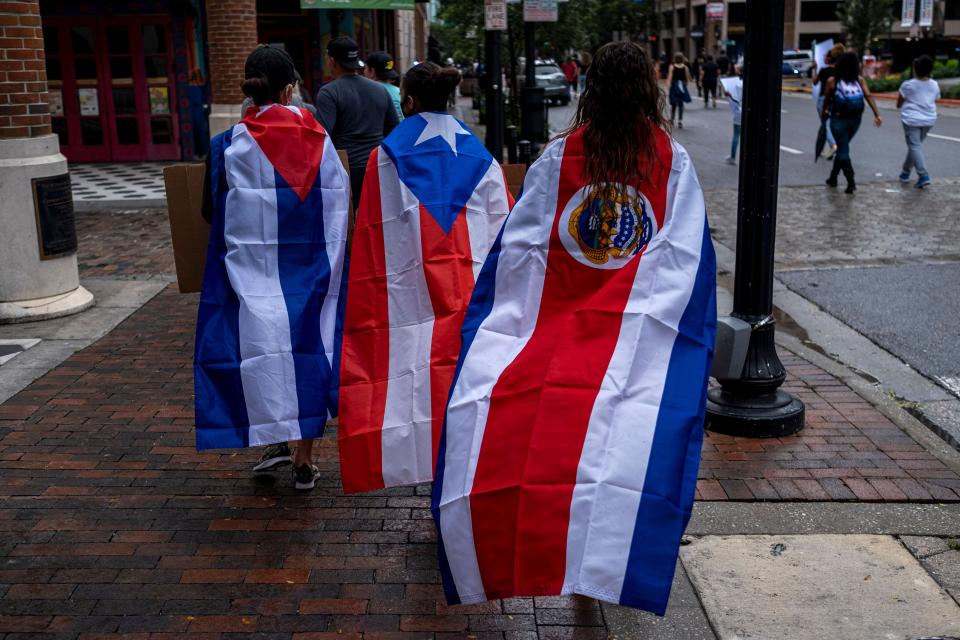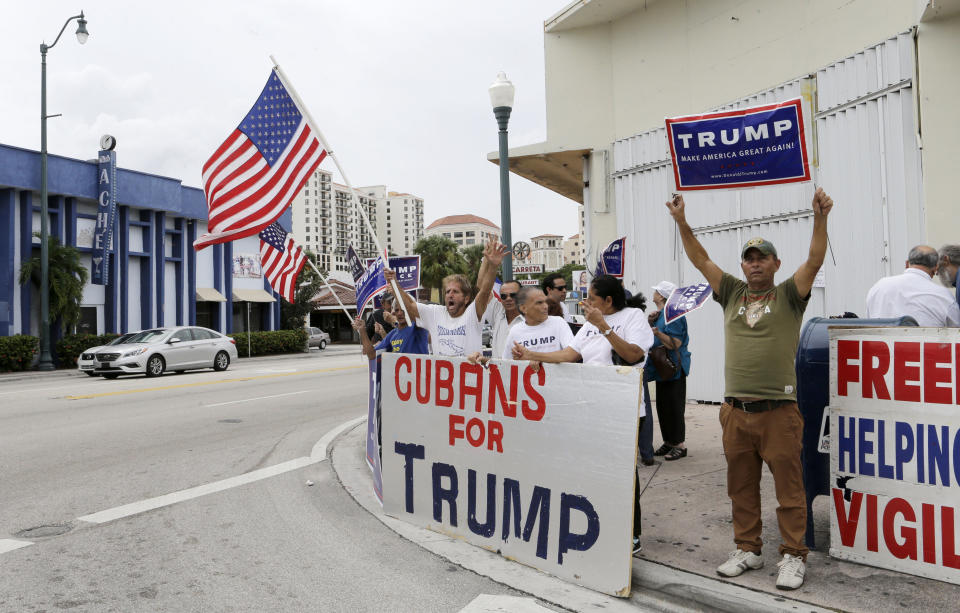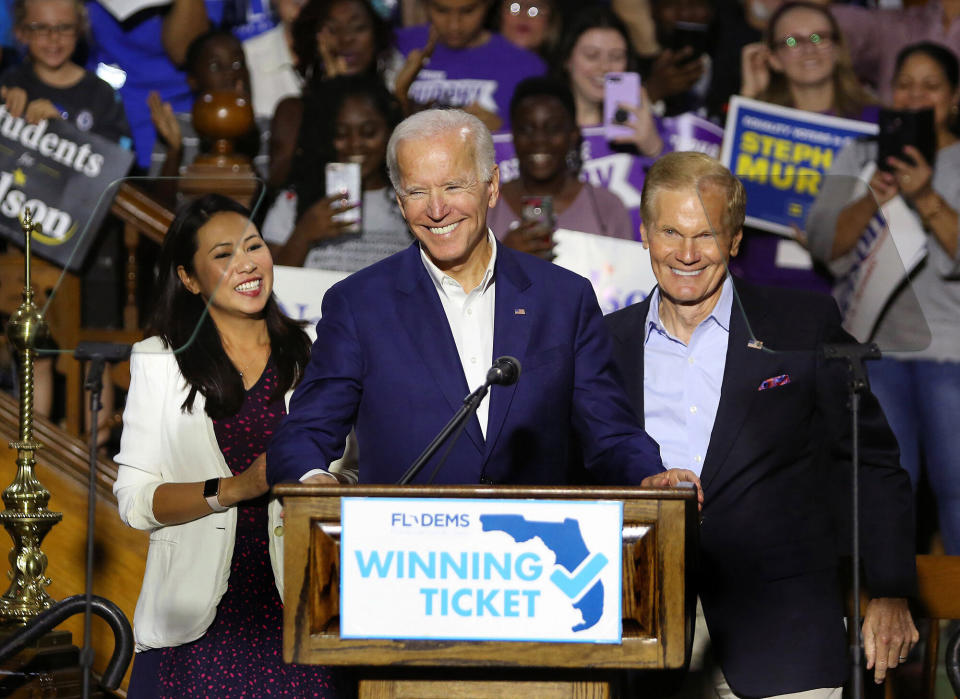The Battle For Florida’s Latino Voters Could Decide The Entire Presidential Election

At the Republican National Convention last week, Florida Lt. Gov. Jeanette Nuñez painted a dire picture of America under Joe Biden. Reliving the story of her family’s decision to flee Cuba, she warned of a looming “socialist takeover of our nation” and urged voters to turn out for President Donald Trump.
“We can go down a dark road of chaos and government control,” said Nuñez, the chair of Latinos for Trump. “Or we can choose the path of freedom and opportunity that was paved by those who sacrificed everything to preserve the American Dream for future generations. Let us join our president in his vow that America will never be a socialist country!”
To win the 2020 election, Trump needs Florida ― no Republican has won the White House without winning the state since 1924, and given Trump’s falling polling numbers in several key battlegrounds, it’s nearly impossible to come up with a combination of outcomes that gets Trump across the 270-vote electoral college threshold without Florida’s 29.
And to win Florida, the president likely needs Cuban Americans like Nuñez to support him in numbers similar to those of 2016, when 54% of Florida’s Cuban American voters backed him over his Democratic opponent Hillary Clinton.
That has set up a furious fight between Trump and Biden for this familiar group of Floridians, who may no longer be the largest bloc of Latino voters in the Sunshine State but are still the most influential. And “socialism” has become a key focus of the dispute, especially as Trump has waged cynical battles to bring down socialist Venezuelan dictator Nicolás Maduro and cripple the Communist Castro government in Cuba.

Unlike Democrats in recent elections, Biden isn’t ignoring the charge. He can’t afford to. He holds a slim lead in Florida overall — and summer polls from Fox News and CNN show him leading Trump by 17 and 19 points, respectively, among Florida’s Latinos — but that’s well behind Clinton’s 2016 margin. Biden’s relative struggle with Latinos nationwide has generated concern that he hasn’t done enough to pitch himself to Latinos who oppose Trump but aren’t sold on the Democratic candidate.
Biden is trying to flip the script on Trump, honing in not just on Cuban Americans but on South Florida’s small-but-growing segment of Venezuelan Americans. Last week, the Biden campaign organized a virtual roundtable where Latino supporters who’d fled Venezuela, Cuba and other authoritarian states in Latin America made the case that it’s Trump who is the caudillo so many Florida Latinos ran away from — the sort of dictatorial strongman they thought they’d left behind.
The federal government’s hard-line response to anti-racist protests this summer may help Biden’s argument. Diego Scharifker, a former student movement leader and city councilman in Caracas who fled Venezuela amid Maduro’s crackdown on political opponents and protesters, said that images of federal agents firing tear gas at protesters outside the White House in June, all so Trump could stage a photo op, was a troubling reminder of home.
“Since I moved here to the U.S. three years ago, I feel like I am living a deja vu,” said Scharifker, a former member of the Venezuelan opposition (which Trump backs) who now leads Venezolanos Con Biden, a grassroots offshoot of the Biden campaign, during the roundtable event. “I’m living the same situations I fled from my country because of political persecution and attacks against democracy.”
Daniela Ferrera, a 22-year-old who fled Cuba and now heads Cubanos Con Biden, added that her family is “terrified” of Trump and what his reelection in November would mean for the country they have adopted as their own.
“We’re reliving the trauma that we lived in Cuba,” Ferrera said. “We lost one homeland, and we refuse to lose another.”
Another Fight Over ‘Socialism’
Trump has leaned into the “socialism” narrative, nationally and in Florida, mimicking the strategy Florida Republicans used against Democrats in 2018. That year, they won narrow victories in the state’s U.S. Senate and gubernatorial contests thanks in part to massive margins among Cuban American voters in South Florida, who had been trending toward Democrats in previous elections.
Trump’s saber-rattling approach to Maduro in Venezuela, the Castro government in Cuba, and President Daniel Ortega in Nicaragua ― the so-called “Troika of Tyranny” of leftist Latin American leaders ― has helped boost support for Trump among Cuban Americans, two-thirds of whom approved of him in a November 2019 poll conducted by Equis Research, a firm that focuses on Latino voters. Among those who arrived in the U.S. after 1993 ― a group that has typically taken a more favorable view of Democrats ― three-quarters approved of Trump’s approach to Cuba and Venezuela.
The poll’s hypothetical head-to-head matchup between Trump and a generic Democrat found the president ahead 63-29, a result that the firm estimated would earn him an additional 90,000 votes over his total in 2016 when he won Florida by just more than 100,000 votes.
Trump’s failures to dislodge Maduro or Raúl Castro and deliver the “new day” of Latin American democracy he once promised ― or to address a novel coronavirus pandemic that has killed at least 10,000 Floridians and cratered the state’s economy ― has left him little choice but to ramp up the rhetoric to even higher volumes, said Frank Mora, a professor of politics and international relations at Florida International University in Miami.
“It’s based on fear-mongering, and trying to play with peoples’ emotions and their frustration with a lack of change in Venezuela and Cuba,” Moura said. “When you have little to offer, or you don’t have much of an agenda that you can show, then you resort to this kind of fear-mongering.”

Biden’s efforts to push back are also informed by the 2018 defeats ― and the fact that at least half of Cuban American voters are still up for grabs, according to Equis.
Two years ago, many Democrats believed the party’s national focus on health care would help bolster its outreach to Latino voters, particularly in South Florida counties that are home to large Cuban American populations and some of the highest Affordable Care Act enrollment rates in the country. When they lost both the gubernatorial and Senate races, many Democrats figured that in 2020, they would have to do more to counter the “socialism” narrative, no matter how cynical it might seem.
“There wasn’t pushback to be like, here’s what socialism is, and here’s what it isn’t,” said Stephanie Porta, the executive director of Organize Florida, a progressive grassroots group. “Or to really reposition that into a conversation about authoritarianism and what’s happening right now in our country.”
Their failure to do so in 2018 may have hampered Democratic efforts to change the narrative of the election: Polls have shown that only a small number of Cuban Americans base their votes entirely on a candidate’s foreign policy toward the island, but in focus groups, Equis researchers found that the “mere mention of socialism” can flip Cuban Americans’ views on issues like health care, where polls show they have more favorable perceptions of Democrats.
“There are things people won’t even consider ― like Medicaid expansion ― because it’s associated with these other [political] systems that have nothing to do with the moment,” said Ana Sofía Peláez, a Cuban American activist and writer who lives in Miami. After the 2018 elections, Peláez helped launch the Miami Freedom Project to bolster progressive engagement with Cuban voters in South Florida. “So we’ve really tried to refocus those conversations.”
The president can yell ‘socialist’ and ‘communist’ all he wants, but it’s what he’s actually done that will count against him. Rep. Donna Shalala (D-Fla.)
So in an effort to blunt Trump’s potential momentum with undecided Cuban and Venezuelan voters, Democrats have argued that Trump’s authoritarian impulses have rendered him incapable of approaching Cuba and Venezuela as anything other than an extension of a domestic political and electoral agenda that is hostile to democracy and especially to Latinos.
Trump “hasn’t done anything” to improve the situations in Cuba or Venezuela, said Rep. Donna Shalala, a Miami Democrat who flipped a South Florida congressional district in 2018. “The president can yell ‘socialist’ and ‘communist’ all he wants, but it’s what he’s actually done that will count against him.”
More than 4 million Venezuelans have left the country over the last four years amid an economic collapse and Maduro’s autocratic governance, but Trump and the GOP have refused to grant Temporary Protected Status to the 200,000 Venezuelan migrants who have attempted to enter the United States. (Biden has said he’d grant TPS to Venezuelans early in his administration.)
And while he has talked tough on Cuba, Trump has pulled Cubans ― who for decades enjoyed preferential immigration status in the U.S. ― into his broader crackdown on immigrants. The United States deported more than 1,100 Cubans in 2019, 10 times the number sent back to the island in the final year of Barack Obama’s presidency.
That has made immigration ― typically a less salient issue in Florida, given the prominence of its Puerto Rican and Cuban communities ― a bigger issue in this year’s elections, Shalala said.
Biden emphasized Trump’s policies at the Democratic National Convention. “He’s failed the Latino community time and again, in order to satisfy the vicious right-wing of his party that he keeps feeding raw meat to,” he said during a conversation with “Hamilton” star Lin-Manuel Miranda.
Love HuffPost? Become a founding member of HuffPost Plus today.

The Pandemic Shifts The Landscape
Florida’s Latino and Caribbean communities are not a monolith, and Democrats’ losses in the recent elections can’t be chalked up to their failures to engage Cuban American voters alone. In 2016, the party also lost ground among Haitian Americans; in 2018, it failed to turn out the expected number of Puerto Ricans, who make up the largest single group of Latino eligible voters in Florida after thousands relocated to the state in the wake of Hurricane Maria.
Efforts to win over Cuban American voters don’t necessarily help make up ground among other Latino voters, and “socialism” talk won’t get a candidate far, one way or the other, outside of South Florida. But focusing on Trump’s authoritarianism might: This year, Equis Research found in focus groups that highlighting Trump’s autocratic tendencies helped drive up opposition among Florida Latinos who aren’t Cuban or Venezuelan.
“I’m old enough to understand the patterns that characterize a dictatorship,” Frandley Julian, a Miami lawyer who was born in Haiti during the country’s Duvalier dictatorship, said during the virtual roundtable last week. “And when I’m looking at the current administration in the United States, I see those same patterns that I had to deal with back home.”
Anti-Trump messaging is insufficient. People want to know where Biden stands. Andrea Mercado, New Florida Majority
Countering the “socialist” attack, the Biden campaign clearly hopes, will also help it shift the focus of the election to the coronavirus pandemic ― which has disproportionately affected Latinos ― and the resulting economic collapse, which has sent unemployment rates skyrocketing and made issues like affordable housing and the minimum wage more prominent.
“The Hispanic community has been disproportionately affected by COVID,” said Rep. Debbie Mucarsel-Powell, who is Ecuadorian American and flipped a GOP-held South Florida seat in 2018. “They’ve lost their jobs. They can’t get quality health care. They’re right now facing food insecurity. The rent is going up here. They know that under a Trump administration, their lives have gotten harder.”
Yet Trump is still above water among Florida Latinos for his handling of the economy, even amid the pandemic-driven downturn, and has recently tried to bolster his standing on that front with a Latino-focused agenda and ads slamming Biden for wanting to raise taxes.
“Anti-Trump messaging is insufficient,” said Andrea Mercado, the executive director of New Florida Majority, a progressive grassroots group that has worked to engage and register Latino voters across the state. “People want to know where Biden stands.”

In August, Biden released his own agenda for the Latino community that outlines detailed policy proposals on a host of economic issues, including affordable housing, access to health care, jobs and wages, and support for Latino small businesses.
“We’re going to use every tool at our disposal to take on inequities that hurt Latinos,” Biden said during the roundtable discussion. He’s also hammered Trump for “turning his back” on Puerto Ricans in the wake of Hurricane Maria, promising that, “as president, I never will.”
There are still concerns, especially among progressives, that Biden hasn’t done enough to engage Latino community leaders or young voters who could help drive turnout to levels necessary to ensure a Democratic victory, and that the campaign and the party are still too focused on winning over moderates at the expense of the base. “Our swing voters are not people who swing from Republican to Democrat, they’re people who swing from voting and staying home,” Mercado said.
The Florida Democratic Party fell short of its goal to register 1 million new voters before the 2020 election. But more than 107,000 new Latino voters registered in 2019, according to the Florida secretary of state’s office, and while nearly half did not choose a party affiliation, 33% registered as Democrats, nearly double the number that chose the GOP.
Turnout for August’s state primary elections was especially high in South and Central Florida, and in Miami, at least, new voters came to the polls in huge numbers. Roughly one-third of the ballots cast were from first-time primary voters, according to Christian Ulvert, a veteran Florida political strategist.
Of the Democrats and unaffiliated voters who cast ballots for the first time, Ulvert said, 70% were Latinos.
Tara Golshan contributed reporting.
Related...
Trump Spouts New Conspiracy Theories In Bizarre Fox News Interview
Here's What Voters Thought Of The 2020 Presidential Conventions
Trump Went To Kenosha To Praise Law Enforcement, Blame Democrats
This article originally appeared on HuffPost and has been updated.

